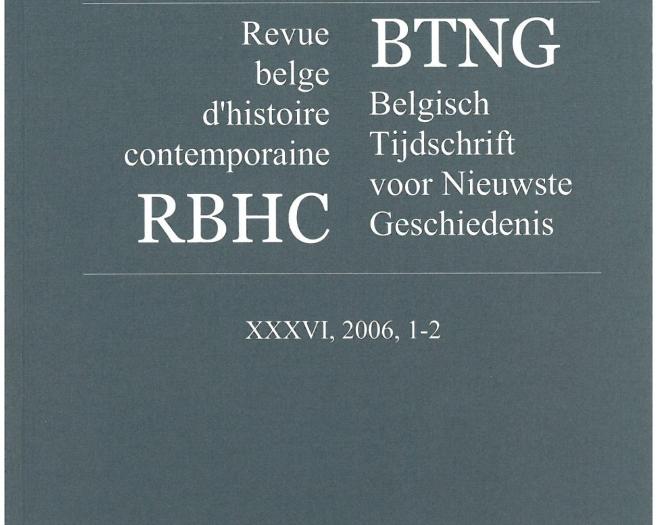The Cold War in the 'old' JBH

The current Journal of Belgian History (Belgisch Tijdschrift voor Nieuwste Geschiedenis/Revue belge d’Histoire contemporaine - JBH/BTNG/RBHC) originated in 2012 from the merger between its eponymous predecessor and the Bijdragen tot de Eigentijds Geschiedenis/Cahiers d'Histoire du Temps présent (BEG/CHTP) which succeeded the Bijdragen tot de Geschiedenis van de Tweede Wereldoorlog/Cahiers d’histoire de la deuxième guerre mondiale in 1997. This page contains a review of articles related to Cold War history published in the "old" JBH. A similar review of such publications in the Bijdragen/Cahiers can be found here. If you are looking for Cold War-related research in the 'new' JBH, please find it here.
The Cold War theme never really occupied a prominent place in the Journal of Belgian History (JBH). Indeed, between the creation of the journal in 1969 and the end of this conflict more than two decades later, the term does not appear once in the pages of the JBH. Still, the journal did pay some attention to postwar history during this period. But even articles like Alain Meynen's on the great labor strike of 1960-1961 (1978/3-4) or the one by Marthe Engelborghs-Bertels in the same issue on historiography in communist China do not include the Cold War as a factor in the analysis.
It is not until the early 1990s (1992/1-2) that the term Cold War is first used in the JBH, and then even in two different articles. Historians Erwin Udding and Georgi Verbeeck, dealing respectively with the denouement of the Royal Question and historiography in the GDR, do not put Belgian actors at the center but rather French and British journalists on the one hand and East German historians on the other. This is the case in Isabelle Boydens' study of the Francophone-Belgian branch of the international Catholic peace movement Pax Christi in the period 1953-1975 (1994-1995/3-4). In each of these three articles, only one mention is found.
Only on its 50th anniversary did authors of the JBH begin to explicitly include this conflict in their analyses. Pascal Deloge takes the lead with his examination of Belgian attitudes toward the German question at the time of the 1955 Geneva Summit (1997/1-2). After that, it takes more than six years before the term is mentioned again. Conny Devolder admittedly did so only once in her study of how Belgian employers and trade unions dealt with American models of more democratic and productive labor organizations (2003/3-4).
During the following two years, the Cold War appears increasingly emphatically and from different angles: first in Patrick Stouthuyzen's essay on the peace movement (2004/3), then in Jan-Willem Stutje's article on the Belgian economist and Trotskyist Ernest Mandel, and then most prominently in Sébastien Baudart's study of the political-social content of comic strips in the Belgian daily press of the late 1940s (both in 2005/1). Still in 2005, Xavier Dejardin and Martin Conway feel the need to refer to the Cold War while outlining the context in which respectively took place the crisis of the CVP during the Royal Question (2005/2-3) and that of the Belgian nation-state in the same and following period (2005/4).
The trend of increasing attention to the impact of the East-West conflict continued thereafter, and historians began to include the term Cold War in their titles beginning in 2006: Widukind De Ridder saw conflict-influenced subjectivity in exclusions from the Belgian Communist Party in the late 1940s and early 1950s (2006/1-2), while Machteld Venken in 2007 studied the Cold War from the memorial practices of former soldiers of the Polish division in Belgium (2007/3-4).
Earlier that year, however, Peter Daerden had started his article on Belgian-Brazilian relations during the Kubitschek years (1956-1960) by condemning the "somewhat one-sided view that [...] international politics after 1945 were entirely determined by the East-West opposition" (2007/1-2). In contrast, in the last issue of the old JBH in which the term Cold War appeared, several authors saw the conflict as determining the fate of refugees and other displaced persons due to World War II (notably Lieselotte Luyckx, and Frank Caestecker and Dirk Vanhulle, 2010/3).